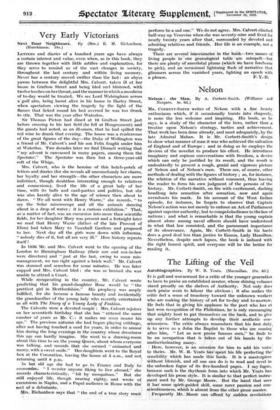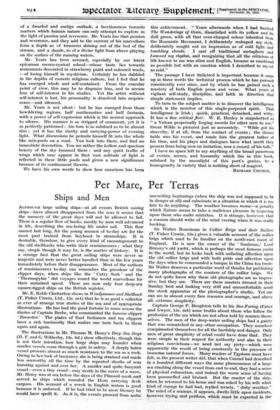The Lifting of the Veil
Autobiographies. By W. B. Yeats. (Macmillan. 10s. 6d.) IT is gall and wormwood for a critic of the younger generation to have to praise an established master, whose shining volumes stand proudly on the shelves of Authority. Not only does such praise seem to labour the obvious ; it also makes the critic feel a sense of treachery toward the unknown workers who are making the history of art for to-day and to-morrow. He feels that in giving his applause to the poet who has at last won recognition of the Philistines, he is only encouraging that mighty host to pat themselves on the back, and to give up any further attempts to develop their aesthetic con- sciousness. The critic always remembers that his first duty, is to serve as a John the Baptist to those who are coming after him, " Let us now praise famous men," he finds to be an occupation that is taken out of his hands by the Undiscriminating many. '
Here, however, is an occasion for him to add his voice to theirs. Mr. W. B. Yeats luiS- spent his life perfecting the sensibility which has made this book. It is a masterpiece without blemish, and all one can do is to read and revel in the unbroken fugue of its five-hundred pages. I say fugue, because such is the rhythmic form into which Mr. Yeats has developed his prose style. It is similar to that perfect instru- ment used by Mr. George Moore. But the hand that uses it has some spirit-guided skill, some rarer passion and con- scientiousness, which is absent from the other prose master.
Frequently Mr. Moore can offend by sudden revelations of a dwarfed and malign outlook, a facetiousness towards matters which- human-nature can only attempt to explore in the light of passion and reverence. Mr. Yeats has that passion and reverence, and they add to the current of his marvellous form a depth as of treasures shining out of the bed of the stream, and a dazzle, as of a divine light from above playing on the surface of the running waters.
Mr. Yeats has been accused, especially by our latest epicurean rococo-cynical school—whose taste lies towards restaurants decorated in strawberry paint and coloured wools, —of losing himself in mysticism. Certainly he has dabbled in the depths of esoteric religious culture, but I feel that he ' has emerged whole and self-contained. From the oracular point of view, this may be to dispraise him, and to accuse him of self-interest in his studies. Yet the artist without self-interest is lost, his personality is dissolved into acquies- cence—and silenced.
Mr. Yeats is not silent : but he has emerged from those bewildering regions, half mathematics and half fantasia, with a power of self-expression which is the nearest approach to silence. His manner is so stripped of ornament, yet it is so perfectly patterned : his tone is so subdued as to be almost dim ; yet it has the clarity and carrying-power of evening light. What discussions he permits himself fit into the whole like rain-pools on a road. You look into them, and find no immediate decoration. You see rather the hollow and spacious beauty of the sky focussed there : and any quiet traffic of wings which may appear in that vast solitude of light is reflected in these little pools and given a new significance because of its confinement therein.
We have his own words to show how conscious has been this achievement. " Years afterwards when I had finished The Wandering* of Oisin, ilissatisAed with its yellow and its dull green, with all that over-charged colour inherited from the Romantic Movement, I deliberately reshaped my style, deliberately sought out an iinpression as of cold light and tumbling clouds. I cast off traditional metaphors and loosened my rhythni, and recognizing that all the criticism of life known to me was alien and English, became as emotional as possible but with an emotion which I described to my sel as cold."
The passage I •have italicized is impartant because it sums up in three words the technical process which he has pursued consistently ever since, and by which he has gained such a mastery of both English prose and verse. What years. of vigilant self-study, discipline, and faith in direction that simple statement implies. '
To turn to the subject matter is to discover the intelligence which is the monitor of this single-purposed spirit. That intelligence is Irish ; quick, practical, detached, and witty. It has a fine critieal-flair: W. E. Henley is snapshOtted as " a Vulcan perpetually forging swords for other men to use." Oscar Wilde is pictured just as accurately. " Wilde got his sincerity, if at all, from the contact of events ; the dinner table was his event, and made him the greatest talker of his time, and his plays and dialogues have what 'merit they possess from being now an imitation, now a record, of his talk."
I have no space left to say anything of the broad panorama of events, scenes, and humanity which lies in this book, subdued by the moonlight of this poet's genius, to a homogeneity in variety that is nothing short of magical.
RICHARD Oilmen,































































 Previous page
Previous page